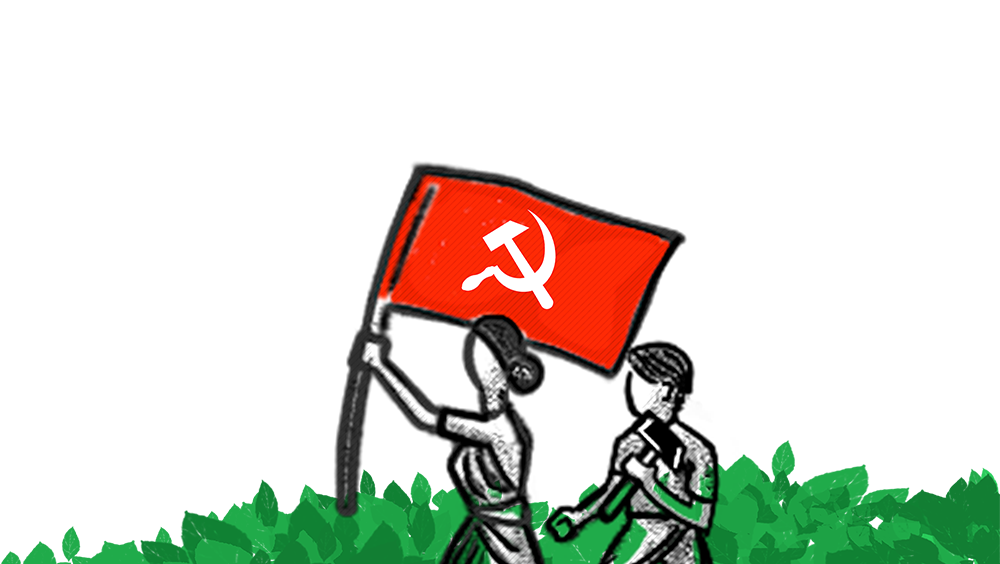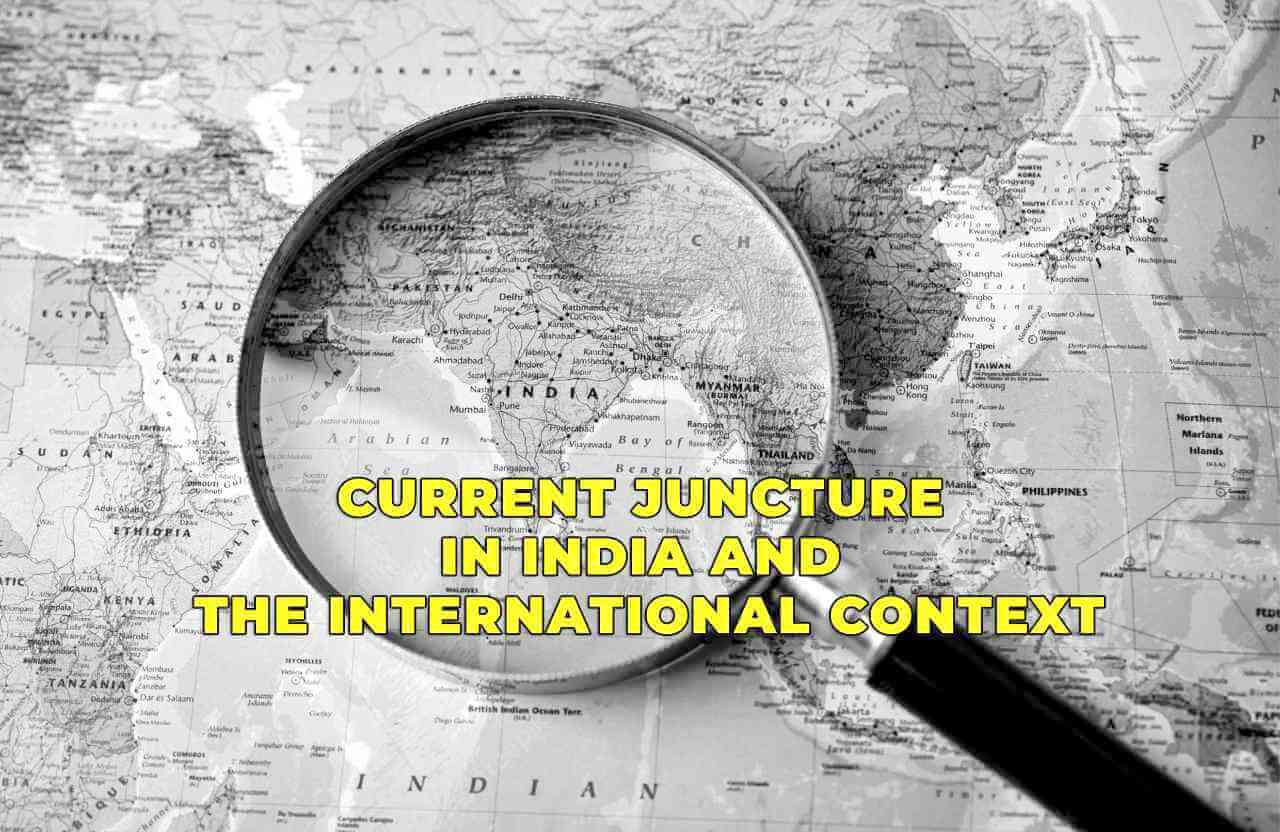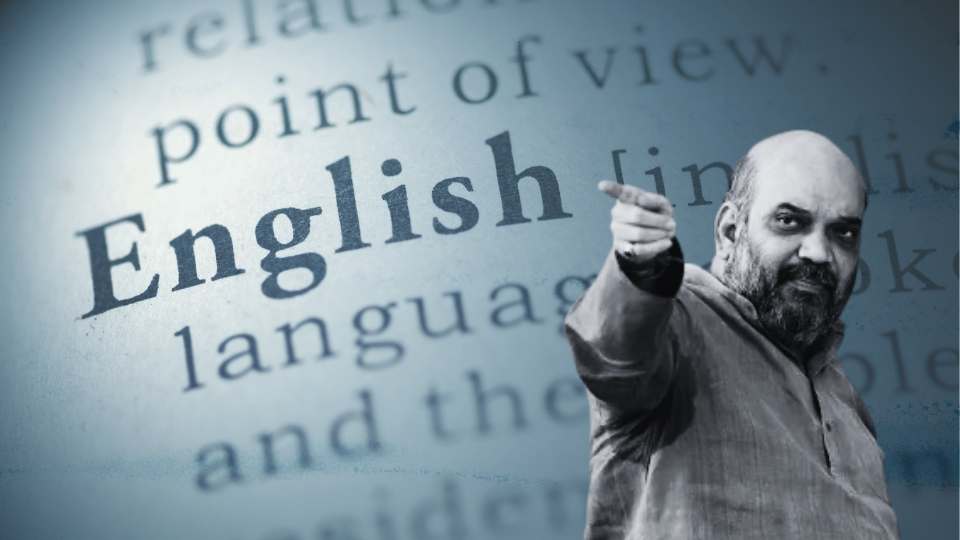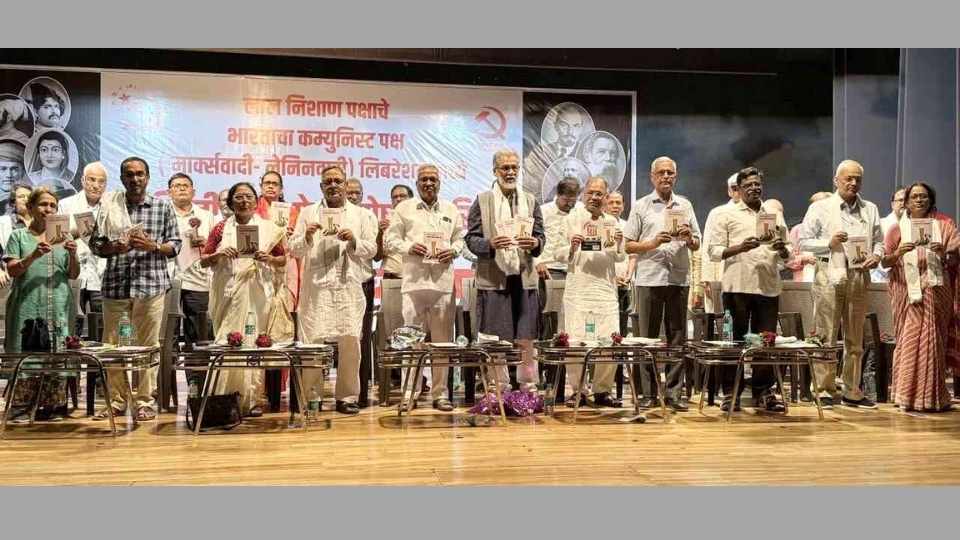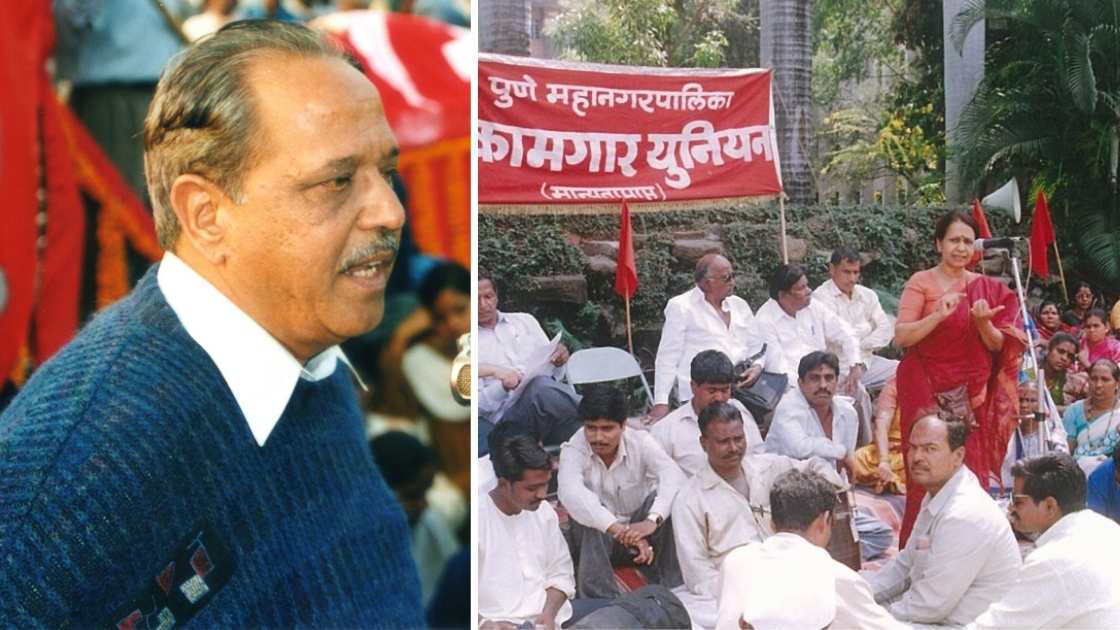Intensifying Fascist Offensive
We have seen this situation build up particularly since the days of the Ayodhya campaign three decades ago. We identified the demolition of the Babri Masjid as a definitive sign or early warning of the rise of communal fascism, a term that gained wider currency in the wake of the 2002 Gujarat genocide. The corporate clamour for making Narendra Modi the Prime Minister of India revealed another unmistakable sign of fascism - loyal corporate backing for the supreme leader. Since 2014 other characteristic features of Indian fascism have been surfacing with alarming rapidity and intensity.
Fascism in India is about the executive undermining and overturning the institutional separation of powers among the executive, legislative and judicial wings to establish absolute executive domination, combined with the unleashing of state-backed non-state actors going on the rampage with targeted anti-Muslim attacks, intensified caste and gender violence and vandalism on India's streets. It is about absolute centralisation of power bulldozing the federal rights of states combined with alarming concentration of wealth in a few hands and unmitigated state-backed corporate plunder. It is about manufacturing consent on an industrial scale by using every possible weapon of mass disinformation and distraction, using both the Sangh brigade's own IT cell and transforming the mainstream media into a veritable lapdog network, popularly known as Godi media. It is about using draconian laws and destroying the basic tenets of justice and rule of law to silence and persecute dissent and create an overwhelming atmosphere of terror and intimidation to disempower citizens and turn them into subjects in a monarchy or colonial dispensation.
RSS as the Driving Force of Indian Fascism
At the heart of what makes the Modi regime not simply an authoritarian regime but a fascist one is the role played by the RSS in bringing about and orchestrating this new order. And we must remember that the RSS was born in 1925 drawing inspiration from the first flush of fascism in the world, from the first fascist regime witnessed by the world under Mussolini in Italy and subsequently from the full-blown fascist project in Hitler's Nazi Germany. It fused this imported ideology with the most regressive social and cultural inheritance from India's past, especially the Brahminical caste system and patriarchy and virulent anti-Muslim hate to define India as a Hindu nation on the basis of what Savarkar termed Hindu nationalism or Hindutva.
While Mussolini and Hitler had an early ascent to power and perished in World War II, the fascists in India have had to wait for long to rise to power at the Centre. Armed with the lessons learnt from the Hitler-era hyper nationalist ideology, mobilisation techniques and genocidal blueprint together with digital era techniques of control and surveillance, Indian fascism today is perhaps the most experienced fascist regime, which is trying to secure domestic support and global approval by combining its Hindu supremacist hyper-nationalism with its pro-US foreign policy that leverages the global attraction for the Indian market, corporate India's growing integration with global capital and India's strategic role as a close ally of the US and Israel.
Of course, India is also part of BRICS and the Shanghai Cooperation Organisation where it shares a platform with Russia and China to maintain a measure of autonomy and distance from the US-led West. But it is Modi's personal hobnobbing with leaders like Trump, Netanyahu and Boris Johnson - incidentally, all these three leaders are now out of power - that expresses the real direction and thrust of Modi government's foreign policy. For a long period after the 2002 Gujarat genocide, Modi as Gujarat CM was denied a visa by several countries in the Western world including the US and UK. But with the growing ascendance of right-wing authoritarianism in global politics, Modi as PM has received strong support from the US-led Western world, which has outlasted the Trump presidency and Modi’s special rapport with Trump.
The aggressive role of RSS and its vast network in realising its long-term fascist design of Hindu Rashtra, subversion of state institutions and orchestrated use of genocidal non-state actors with state patronage and impunity, loyal corporate support and strategic imperialist backing are the four key props on which the Modi regime is advancing the fascist agenda of the Sangh with escalating rapidity. The BJP had come to power in 2014 with the slogan of 'Congress-mukt Bharat' or Congress-free India and now it is systematically seeking to turn India into a dissent-free democracy. The BJP president says soon BJP will be the only party left in the country while Home Minister Amit Shah keeps bragging that BJP is here to rule India for the next fifty years.
Communist Role in the Anti-fascist Resistance
India is surely waking up to the fascist danger. Recent years have seen remarkable movements of different sections of Indian people. From the student movement in the wake of the institutional murder of Rohith Vemula, renewed Dalit awakening following the atrocities in Gujarat's Una to the massive Shaheen Bagh protests led by Muslim women against the discriminatory and divisive amendments to the citizenship laws and the year-long historic movement of India's farmers that compelled the Modi government to repeal the three farm laws designed to promote an outright corporate takeover of Indian agriculture, we have witnessed a series of powerful and determined protests defying hate, fear and tremendous repression. The protests of the people and the fascist steam rolling of federalism and all-out attack on opposition have begun to energise a greater degree of opposition unity and dynamism. But significant sections of the opposition are hesitant to take a firm stand against the RSS and its vicious campaign of hate and violence and prefer to limit their opposition to the Modi government. Here too, questions of state repression and political liberty of citizens and the need for a reversal of policy direction away from privatisation to people's welfare remain largely neglected.
This is where revolutionary communists will have to play their role to wage the most determined, comprehensive and sustained resistance and defeat fascism through a protracted battle. Communists will have to help build and sustain movements on the ground and mobilise that energy to promote unity and dynamism in the parliamentary opposition camp to dethrone the fascist forces. Given the strength the fascist forces have already acquired and the damage they have already done to the cause of democracy and advancement of India, it is clear that democratic forces are in for a long haul. Using Ambedkar's analogy, if we see Hindu Rashtra as the greatest calamity on India, our response cannot be limited to the immediate disaster management approach of rescue and relief, it has to go the whole hog and accept the challenge of reconstruction.
With profound insight, Ambedkar had pointed to the contradictions of India's constitutional journey - the growing unsustainability and irrelevance of electoral equality in the face of mounting social and economic inequality, and the antithesis between the top dressing of constitutional democracy and the underlying undemocratic soil. The answer to fascism lies in the strengthening and deepening of democracy, in making it more thorough-going and consistent to rid it of its internal contradictions and expanding it to every sphere of social life. Historically, this was the promise of socialism, and fascism arose a hundred years ago in Italy precisely to combat and crush the socialist dream. Making the constitutional vision and the proclamation which termed India a sovereign socialist secular democratic republic into a genuine reality provides the real answer to the growing fascist offensive in India today.
International Context: Deepening Crisis, Authoritarianism and War
As already noted, this fascist offensive in India is intensifying in a conducive global environment of rise of rabid right-wing forces across the world. Aiding this rise of the right is the current phase of prolonged and deep economic decline of global capitalism compounded by the massive disruption caused by the Covid19 pandemic. Since February 2022 we are also witnessing a serious escalation of war in Europe following the Russian invasion of Ukraine even as Yemen and Palestine continue to be ravaged by Saudi Arabia and Israel respectively and the US continues to explore ever newer ways to encircle and target China. CPI(ML) has categorically condemned Russia for the invasion of Ukraine insisting on cessation of war and restoration of peace guaranteeing the sovereignty of Ukraine. We have also condemned Russian chauvinism and its expansionist Eurasianism that sees Ukraine essentially as an integral part of Russian territory and culture and attributes the sovereign existence of Ukraine to Lenin's 'mistake' that needs to be undone.
We do not accept the Russian narrative that invokes NATO's eastward expansion as a justification for the ongoing war. However, there can be no mistaking the fact that while both Ukraine and Russia bleed in the war and much of the world has to pay a heavy price, the US benefits the most without any direct involvement in the war. Historically, it has been using NATO as a weapon to sustain its geopolitical and military domination throughout the Cold War and post-Soviet periods. There was no justification for NATO to continue after the collapse and disintegration of the USSR and the Warsaw Pact. But instead of dismantling NATO, the US went about expanding NATO, raising the number of NATO member countries from the founding 12 to 30 at present. This expansion is not just to contain Russia and its growing cooperation with China, it is also to retard the rise of Europe as a parallel power. Even now while claiming to help Ukraine defend its sovereignty, the US and corporate capital is busy effectively colonising the Ukrainian economy with vast swathes of land, state owned enterprises and industries transferred to corporates, accompanied by deregulation and slashing of labour laws. President Zelensky launched this massive selloff campaign which he calls 'Advantage Ukraine' at the New York Stock Exchange.
After the Islamophobic ‘Operation Enduring Freedom’ or the so-called global war on terror, the US is now trying to recreate the Cold War era environment while sections of pro-US ideologues and propagandists have begun to identify the Russia-China partnership as the Germany-Italy-Japan axis of World War II, advocating a US-led global alliance against this renewed fascist danger in the world. A crisis-ridden declining US is trying to whitewash its litany of continuing imperialist crimes and reinforce its design of exclusive domination in a unipolar world by presenting itself as the self-styled global champion of democracy as though the world has forgotten its bloody and sinister history of 'export of democracy'.
A Multipolar World over American Unipolarity
Regardless of the internal character of competing global powers, a multipolar world is certainly more advantageous to progressive forces and movements worldwide in their quest for reversal of neoliberal policies, social transformation and political advance. The inter-imperialist rivalry of the early 20th century produced not just World War I but also facilitated the November revolution which snapped the imperialist chain at its weakest link. Despite its severe internal distortions and degeneration, it was the Soviet Union which succeeded in overpowering fascism and concluding World War II on a victorious note for anti-colonial struggles and revolutionary movements. In subsequent decades even as the Soviet Union stagnated internally and got trapped in an unsustainable arms race and superpower rivalry with the US, its existence as a countervailing force against American domination helped many countries and movements in the third world to pursue their own course with a considerable degree of relative autonomy from imperialist control. The liberation of Bangladesh was a key example in our own neighbourhood.
Following the collapse of the Soviet Union and Warsaw Pact, the US remained the sole superpower and for a period the world did appear to have turned unipolar. In terms of right-wing theorists, Fukuyama characterised this phase as the universal reign of liberal democracy as the ultimate state form with his triumphalist book 'The End of History and the Last Man'. Samuel Huntington on the other hand acknowledged the US’s need for a new ‘enemy’ and described the new era as one of a 'Clash of Civilizations’ in place of the Cold War reality of clash of ideologies. While Huntington was drawing his fault lines keeping the US and a US-led West at the centre, Russian political philosopher and analyst Aleksandr Dugin was visualising a future with Russia at the centre and Eurasia as the ultimate answer to western domination.
Today, following Russia's invasion of Ukraine, even as Fukuyama calls it 'the end of the end of history' American historians like Timothy Snyder and Anne Applebaum are urging the liberal democracies of the world to unite under US leadership and defeat autocracies or totalitarian regimes by any means necessary including military. But is this not precisely what the US has claimed to be doing all along, especially in the post-war world, and has it not only meant endless wars, brutal occupations and toppling of regimes, including elected ones, through US-sponsored coups and even direct wars of invasion and occupation, to install puppet rulers or pave the way for dictators and regressive, repressive regimes. From Indonesia and Chile to more recent cases like Iraq, Libya and Afghanistan, we have seen the violence and devastation of US intervention across the world in the name of 'export or defence of democracy'.
The history of imperialism therefore cannot be reduced to a linear global narrative or a simple democracy-versus-autocracy binary. We want Ukraine to successfully defend its sovereignty, the people of Russia to overcome the oligarchy and brutal repression of the Putin regime and the people of China, including its beleaguered minorities, to have far greater domestic democracy and liberties. But we also have to recognize that the US strategy of containment of Russia and China is aimed not at these goals, but at securing global hegemony of US imperialism and stopping the world from becoming multipolar. Ukraine is not the only war going on in the world today even though in the global media it has eclipsed and erased other conflicts and wars. Solution to one war will not lead to the establishment of peace and justice in another conflict, for all wars have their own causes and contexts. The forces of peace, justice and democracy will have to speak up against every unjust war of invasion and occupation and every suppression and denial of democracy.
Combining National Priority and Internationalist Commitment
This brings us, communists or more generally democrats of all schools/streams in India, back to the primary and compelling question of fighting fascism in India. Communism being an internationalist ideology and movement, we communists of course have to constantly combine our international response in which we hold high the banner of proletarian internationalism, with our national role. This combination is easier said than done and the history of communist movement in India over the last hundred years has been witness to several instances where the movement has erred or faltered on this score.
To understand this challenge requires going back to the foundational basics of the international communist movement. The Communist Manifesto of course ended with the clarion call urging workers to unite worldwide and fight and defeat capital internationally. The Manifesto underlined the inherent tendency of capital to disregard national borders and expand through every pore and turn everything, every aspect of life, into a commodity. The working class too should therefore think and act on a global scale. At the same time, the Manifesto is very categorical that in every nation-state, the proletariat should dethrone capital and strip it of its power to define the interests and identity of the nation and declare itself the nation. The other important point is the assertion of proletarian independence against one's own ruling class within the nation. The possibility of building socialism within national boundaries actualized first through the victory of the November Revolution followed from this core premise of the Communist Manifesto.
The international organisations of the working class faced the pulls and pressures of this challenge of combining the national and international dimensions and tasks of the socialist/communist movement. The First international spread the message and spirit of international working class solidarity and led to the first major ideological demarcation between anarchists and socialists. The Second international called the socialist International collapsed under the pressure of competing nationalisms and the first inter-imperialist war. The Third international called the Communist International disseminated the spirit of the victorious socialist revolution, helped the fledgling communist movement to grow and take shape in diverse contexts ranging from national liberation struggles in colonies and semi-colonies to parliamentary struggles in liberal democracies and the encounter with extreme reaction in the form of fascism.
The contrasting experiences of the communist movement in China and India however also exposed the limitations and problems of prioritizing the international at the expense of the national situation. While the Chinese movement succeeded in charting its own course in opposition to the central guideline, the movement in India faltered at different junctures in reconciling the demands of the national movement and complexities of the national reality with the direction of the international context. The problem became most apparent when the communist approach to World War II changed dramatically from imperialist war to people's war following Nazi Germany's invasion of the Soviet Union. The tactical error committed by the Indian communist movement in failing to prioritise the advancement of India's own anti-colonial struggle caused a temporary setback to the movement. In our own CPIML movement while rightly trying to draw inspiration from the victory of the Chinese revolution in a predominantly agrarian and backward society we erred in coining slogans that projected the party and the movement as a loyal imitation of China and undermined our independent response to the Indian reality.
Today the communist movement in India faces the historic responsibility of contributing its best to defeat the fascist offensive. The international context too demands a concerted powerful response from all progressive forces in the face of deep and prolonged economic recession, rise of authoritarian regimes and the havoc of climate change. Progressive forces worldwide will have to unite against all imperialist aggression and warmongering, resist authoritarian forces in their respective contexts and intensify the battle for socialism in the twenty first century.

